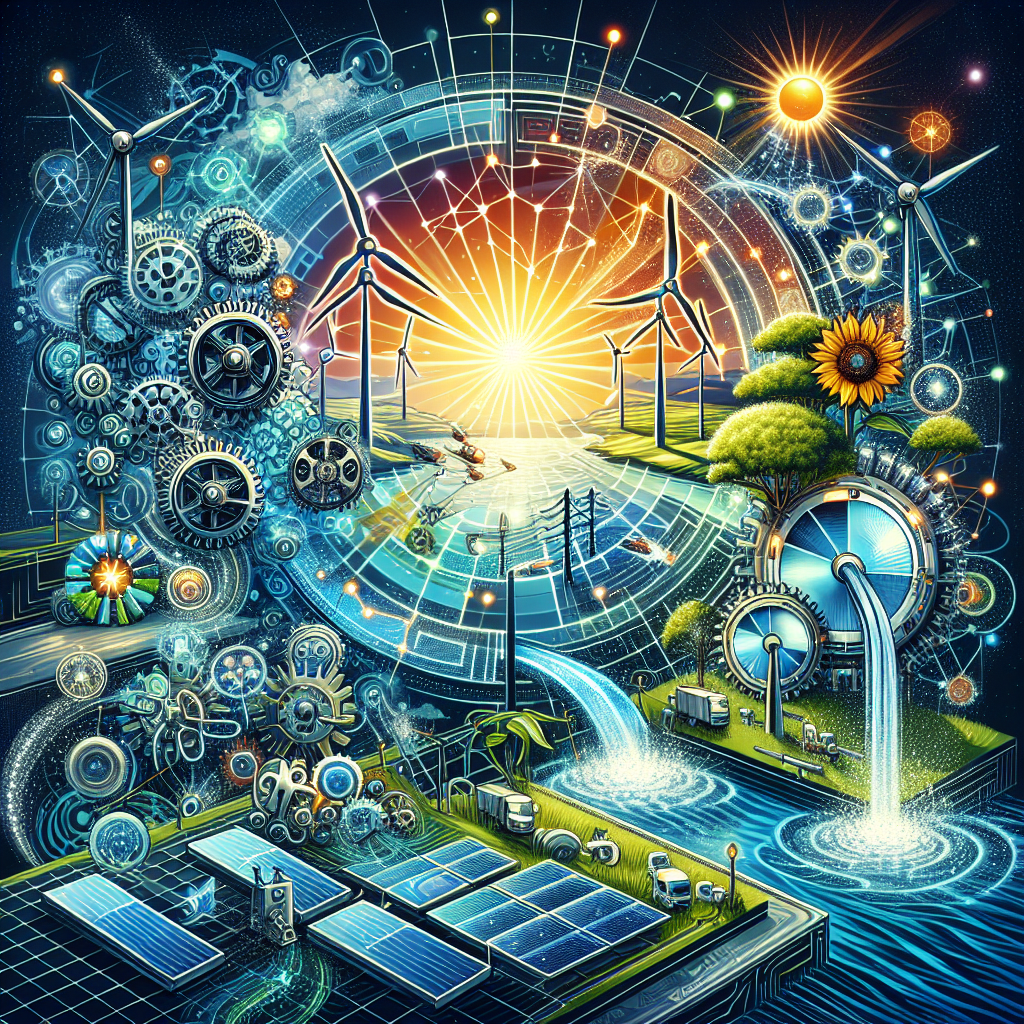With the increasing global focus on sustainability and reducing carbon emissions, renewable energy sources like solar, wind, and hydroelectric power are becoming more prevalent. However, one of the challenges in integrating renewable energy sources into the existing energy grid is optimizing energy distribution to ensure a stable and reliable supply of electricity. Artificial intelligence (AI) technology is emerging as a powerful tool in addressing this challenge by helping to optimize energy distribution in renewable energy systems.
AI algorithms can analyze vast amounts of data in real-time to optimize energy distribution by predicting energy demand, managing energy storage, and balancing energy supply from different sources. By using AI to optimize energy distribution, renewable energy systems can operate more efficiently, reduce costs, and reduce environmental impact. In this article, we will explore how AI is being used to optimize energy distribution in renewable energy systems and the benefits it can bring.
Predicting Energy Demand
One of the key challenges in renewable energy systems is predicting energy demand accurately. Unlike traditional energy sources like coal or natural gas, which can be easily adjusted to meet fluctuating demand, renewable energy sources like solar and wind are dependent on weather conditions and can be intermittent. AI algorithms can analyze historical data, weather patterns, and other relevant factors to predict energy demand accurately.
By accurately predicting energy demand, renewable energy systems can better plan for energy production and storage, reducing wastage and ensuring a stable supply of electricity. This can help reduce costs and improve the overall efficiency of the energy system. AI algorithms can also adjust energy production in real-time based on changes in demand, ensuring that energy is distributed efficiently and effectively.
Managing Energy Storage
Energy storage is a critical component of renewable energy systems, allowing excess energy to be stored and used when needed. AI algorithms can optimize energy storage by analyzing data on energy production, demand, and storage capacity to determine the most efficient way to store and distribute energy. By using AI to manage energy storage, renewable energy systems can maximize the use of renewable energy sources and reduce reliance on fossil fuels.
AI algorithms can also optimize the charging and discharging of energy storage systems to ensure that energy is stored and used efficiently. This can help reduce costs and improve the overall performance of renewable energy systems. By using AI to manage energy storage, renewable energy systems can be more flexible and responsive to changes in energy demand, ensuring a stable and reliable energy supply.
Balancing Energy Supply from Different Sources
Renewable energy systems often rely on multiple energy sources, such as solar, wind, and hydroelectric power. Balancing energy supply from these different sources can be challenging, as each source has its own unique characteristics and limitations. AI algorithms can analyze data on energy production, demand, and supply from different sources to optimize energy distribution and ensure a stable supply of electricity.
By using AI to balance energy supply from different sources, renewable energy systems can reduce the risk of energy shortages and blackouts. AI algorithms can adjust energy production from different sources in real-time based on changes in demand and supply, ensuring that energy is distributed efficiently and effectively. This can help improve the reliability and stability of renewable energy systems, making them more resilient to fluctuations in energy supply.
Benefits of Using AI to Optimize Energy Distribution
There are several benefits to using AI to optimize energy distribution in renewable energy systems. Some of the key benefits include:
Improved Efficiency: AI algorithms can analyze vast amounts of data in real-time to optimize energy distribution, reducing wastage and improving overall efficiency. By using AI to optimize energy distribution, renewable energy systems can operate more efficiently and reduce costs.
Increased Reliability: By accurately predicting energy demand and balancing energy supply from different sources, AI can help ensure a stable and reliable supply of electricity. This can reduce the risk of energy shortages and blackouts, improving the reliability of renewable energy systems.
Reduced Environmental Impact: By optimizing energy distribution, renewable energy systems can reduce reliance on fossil fuels and lower carbon emissions. This can help mitigate climate change and reduce the environmental impact of energy production.
Cost Savings: By optimizing energy distribution, renewable energy systems can reduce costs associated with energy production, storage, and distribution. This can help make renewable energy more cost-effective and competitive with traditional energy sources.
FAQs
Q: How does AI help predict energy demand in renewable energy systems?
A: AI algorithms can analyze historical data, weather patterns, and other relevant factors to predict energy demand accurately. By using AI to predict energy demand, renewable energy systems can better plan for energy production and storage, reducing wastage and ensuring a stable supply of electricity.
Q: How does AI optimize energy storage in renewable energy systems?
A: AI algorithms can analyze data on energy production, demand, and storage capacity to determine the most efficient way to store and distribute energy. By using AI to manage energy storage, renewable energy systems can maximize the use of renewable energy sources and reduce reliance on fossil fuels.
Q: How does AI balance energy supply from different sources in renewable energy systems?
A: AI algorithms can analyze data on energy production, demand, and supply from different sources to optimize energy distribution. By using AI to balance energy supply from different sources, renewable energy systems can reduce the risk of energy shortages and blackouts.
In conclusion, AI technology is playing a crucial role in optimizing energy distribution in renewable energy systems. By accurately predicting energy demand, managing energy storage, and balancing energy supply from different sources, AI algorithms can help improve the efficiency, reliability, and sustainability of renewable energy systems. As the global transition to renewable energy accelerates, AI will continue to play a key role in optimizing energy distribution and maximizing the potential of renewable energy sources.

